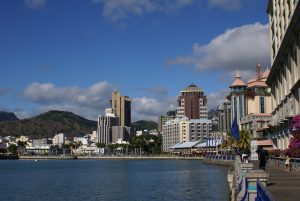Much of recent debate concerns how maritime domain awareness (MDA) and information sharing can be effectively organized, in particular under resource constraints. Surveillance technology and tools for data fusion and algorithmic analysis are expensive. The tools developed by MDA centers in the US, UK or in Singapore are hardly options for lower income countries and regions. Yet, what are the alternatives? An answer comes from Pakistan.
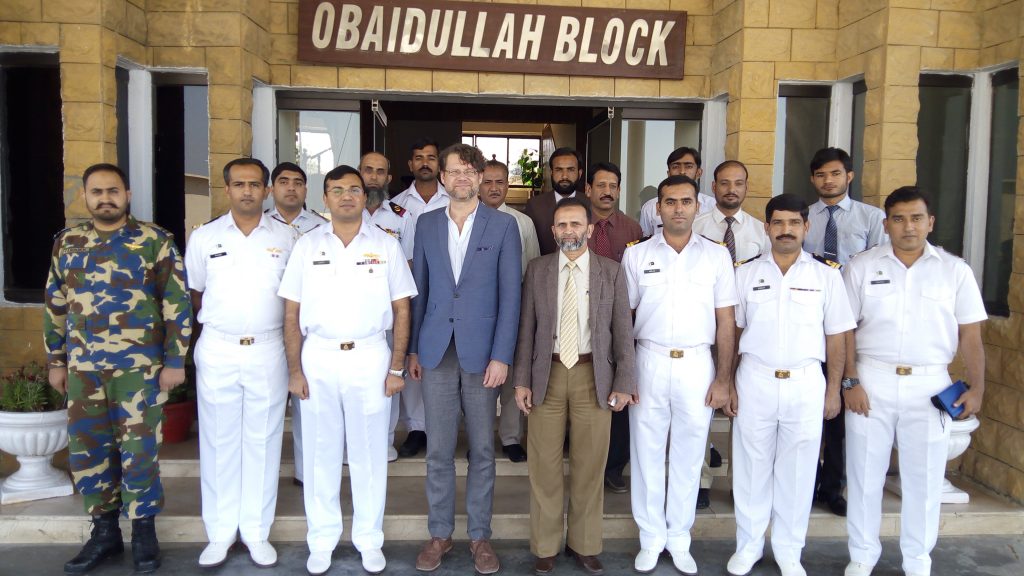 In 2013 Pakistan has inaugurated its Joint Maritime Information Coordination Center (JMICC). Situated in Karachi and operated by the Pakistani Navy the center has developed an innovative approach to MDA which provides useful lessons for other countries and regional centers. Three core principles underly the work JMICC: inclusivity, community engagement, and responsiveness. During a visit to the center on the 15th of February, I had the opportunity to learn more about how the center works and puts these principles into practice. Each of the principles is discussed in the following. Continue reading
In 2013 Pakistan has inaugurated its Joint Maritime Information Coordination Center (JMICC). Situated in Karachi and operated by the Pakistani Navy the center has developed an innovative approach to MDA which provides useful lessons for other countries and regional centers. Three core principles underly the work JMICC: inclusivity, community engagement, and responsiveness. During a visit to the center on the 15th of February, I had the opportunity to learn more about how the center works and puts these principles into practice. Each of the principles is discussed in the following. Continue reading
Author Archives: admin
International Maritime Conference in Karachi
Pakistan’s most important conference on maritime security is organized by the National Centre for Maritime Policy Research (NCMPR), the think tank of the country’s navy based at Bahria University. This year’s installment of the event is under the theme “Strategic Outlook in the Indian Ocean Region 2030 and Beyond: Evolving Challenges and Strategies”. The conference is held in conjunction with the naval exercise Aman, in which over 70 countries participate.
At the four-day conference (10-14.2), I gave a presentation titled “Pakistan and the Western Indian Ocean Community”. Drawing on the results of our recent analysis of the region, in the paper, I review the current strategic environment in the Western Indian Ocean, argue that the region can find a shared strategic vision in the concept of security community, and outline consequences for Pakistani’s foreign and security policy. I particularly highlight the need for sustained multilateral engagement in fora such as the Indian Ocean Naval Symposium, the Indian Ocean Maritime Crime Forum, the Contact Group on Piracy off the Coast of Somalia, or the Djibouti Code of Conduct process. The paper is available here.
SAFE SEAS recruits research associate
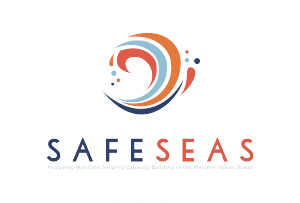 For my new research project SAFE SEAS funded by the British Academy and run together with Tim Edmunds from the University of Bristol we are currently looking for a research associate to support the project. We will also be recruiting research assistants based in Kenya, Seychelles, Djibouti and Somalia soon. The job add is as follows
For my new research project SAFE SEAS funded by the British Academy and run together with Tim Edmunds from the University of Bristol we are currently looking for a research associate to support the project. We will also be recruiting research assistants based in Kenya, Seychelles, Djibouti and Somalia soon. The job add is as follows
Research Associate (5611BR)
School of Law and Politics, Cardiff University
The School of Law and Politics invites applications for a one year postdoctoral position (Research Associate). The position is in the frame of the project “Safe Seas. A study of Maritime Security Capacity Building in the Western Indian Ocean” funded by a British Academy Sustainable Development grant. Safe Seas is a pilot project and compares the ongoing efforts to restructure the maritime security sector in four countries (Djibouti, Kenya, Seychelles, and Somalia). The aim of Safe Seas is to develop key guidelines and best practices for the programming and implementation of maritime security capacity building and maritime security sector reform. The successful candidate will work under the supervision of Dr. Christian Bueger and will undertake research and administrative work that supports the goals of the project. Further information on the project is available at www.safeseas.net. Further details about the post can be found at http://www.cardiff.ac.uk/jobs (Reference 5611BR).
This is a full time post, fixed term for 12 months, and is expected to end 31 March 2018.
Closing date for Application: Monday, 27 February 2017. Please be aware that Cardiff University reserves the right to close this vacancy early should sufficient applications be received. Cardiff University is committed to supporting and promoting equality and diversity. Our inclusive environment welcomes applications from talented people from diverse backgrounds.
SAFE SEAS project website launched
 The website of my new research project SAFE SEAS. A study of maritime security capacity building in the Western Indian Ocean is now online at www.safeseas.net. The project is funded by the British Academy’s Sustainable Development Programme. In a project team of seven staff members we will develop 1) experienced based case studies on success and failure of capacity building for maritime security in the region (Djibouti, Kenya, Seychelles, Somalia), 2) a methodology for the assessment of maritime security sectors, and 3)A best practice tool kit for the planning, programming and implementation of capacity building projects. The website provides regular updates on research results.
The website of my new research project SAFE SEAS. A study of maritime security capacity building in the Western Indian Ocean is now online at www.safeseas.net. The project is funded by the British Academy’s Sustainable Development Programme. In a project team of seven staff members we will develop 1) experienced based case studies on success and failure of capacity building for maritime security in the region (Djibouti, Kenya, Seychelles, Somalia), 2) a methodology for the assessment of maritime security sectors, and 3)A best practice tool kit for the planning, programming and implementation of capacity building projects. The website provides regular updates on research results.
Global Initiative against Transnational Organized Crime Network
With the start of the new year, I have joined the Global Initiative against Transnational Organized Crime Expert Network.
The Global Intiative provides a platform for greater debate and to identify innovative approaches that could form the building blocks of an inclusive global strategy against organized crime. It was born from a series of high-level, off the record discussions between law enforcement officials from both developed and developing countries in 2011-12. At these meetings, the founders of the Global Initiative, many of whom stand at the front line of the fight against organized crime, illicit trafficking and trade, concluded that the problem and its impacts are not well analyzed; they are not systematically integrated into national plans or strategies; existing multilateral tools are not structured to facilitate a response; and existing forms of cooperation tend to be bilateral, slow and restricted to a limited number of like-minded states.
Out of Office: Xmas break and the new year
Handbook on International Political Sociology published
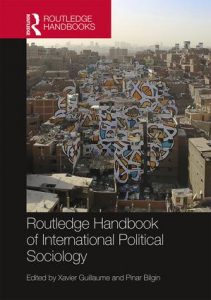 The Handbook of International Political Sociology edited by Xavier Guillaume and Pinar Bilgin has been published. The handbook provides a survey through the multi-dimensional field of international political sociology, explores core issues, theories and methods as well as the connections to cognate disciplines. It will become a useful resource for students and scholars and further strengthen the field. In my own chapter I discuss the practice turn and its methodological implications. Preview the book here.
The Handbook of International Political Sociology edited by Xavier Guillaume and Pinar Bilgin has been published. The handbook provides a survey through the multi-dimensional field of international political sociology, explores core issues, theories and methods as well as the connections to cognate disciplines. It will become a useful resource for students and scholars and further strengthen the field. In my own chapter I discuss the practice turn and its methodological implications. Preview the book here.
The Indian Ocean Rim Association: A start-up in the field of maritime security?
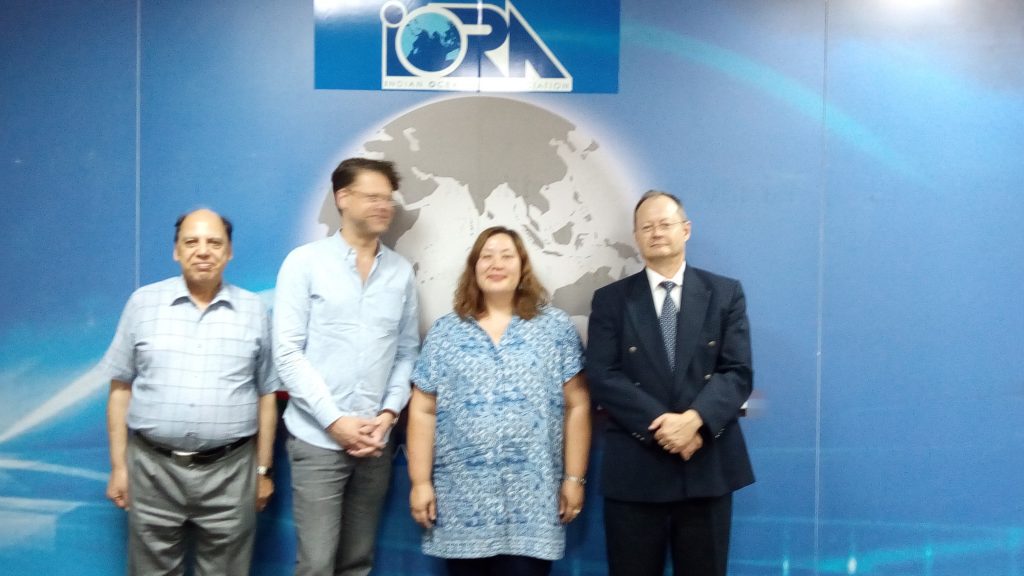 The Indian Ocean Rim Association intends to strengthen regional cooperation among the Indian Ocean littorals. For long it has been a sleeping beauty. But it was kissed awake in the last years, and now becomes an increasingly active and visible player in several priority areas. Among them: Maritime security and safety, fishery management and the blue economy. IORA promises to become a core player in ocean governance. In particular, the emerging issues areas of maritime security and the blue economy continue lack international fora; a gap that IORA can fill on a regional level. Today I had the pleasure to discuss the work of IORA at the Secretariat’s headquarters in Mauritius’ cyber city. IORA continues to operate with a small secretariat with no more than twelve permanent staff members. The secretariat approach is fully service oriented and it offers its expertise and organizational support to projects and proposals of member states which it implements through a Special Fund. On this basis, the IORA secretariat has organized an impressive range of 30 events throughout 2016, including a blue economy conference. Continue reading
The Indian Ocean Rim Association intends to strengthen regional cooperation among the Indian Ocean littorals. For long it has been a sleeping beauty. But it was kissed awake in the last years, and now becomes an increasingly active and visible player in several priority areas. Among them: Maritime security and safety, fishery management and the blue economy. IORA promises to become a core player in ocean governance. In particular, the emerging issues areas of maritime security and the blue economy continue lack international fora; a gap that IORA can fill on a regional level. Today I had the pleasure to discuss the work of IORA at the Secretariat’s headquarters in Mauritius’ cyber city. IORA continues to operate with a small secretariat with no more than twelve permanent staff members. The secretariat approach is fully service oriented and it offers its expertise and organizational support to projects and proposals of member states which it implements through a Special Fund. On this basis, the IORA secretariat has organized an impressive range of 30 events throughout 2016, including a blue economy conference. Continue reading
Field Visit to Mauritius
As part of my ESRC funded project “Improving the Coordination of Maritime Security in the Western Indian Ocean” I am visiting Mauritius from the 15th to 20th of December. I am scheduled to meet with representatives from the Indian Ocean Commission (IOC), the Indian Ocean Rim Association (IORA), the University of Mauritius and other maritime experts. The goal of the visit is to gain a better understanding of how the coordination of capacity building activites in the region can be improved in particular in the light of the significant overlap between the CRIMARIO and MASE projects as well as bilateral work.
1st BIMCO Maritime Security Seminar
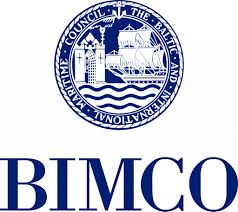 From the 12th to the 13th of December BIMCO is holding its first Maritime Security Seminar in its headquarters in Denmark. The three main sessions of the event focus on 1) piracy, 2) other maritime crime, and 3) maritime terrorism. Over 70 participants represent mainly shipping companies and other industry bodies. The event intends to rethink the importance of the maritime security agenda for the shipping industry. At the event I am giving a presentation that reflects on maritime terrorism and how it is linked to the situation of coastal populations.
From the 12th to the 13th of December BIMCO is holding its first Maritime Security Seminar in its headquarters in Denmark. The three main sessions of the event focus on 1) piracy, 2) other maritime crime, and 3) maritime terrorism. Over 70 participants represent mainly shipping companies and other industry bodies. The event intends to rethink the importance of the maritime security agenda for the shipping industry. At the event I am giving a presentation that reflects on maritime terrorism and how it is linked to the situation of coastal populations.

